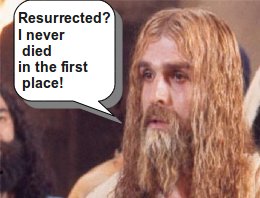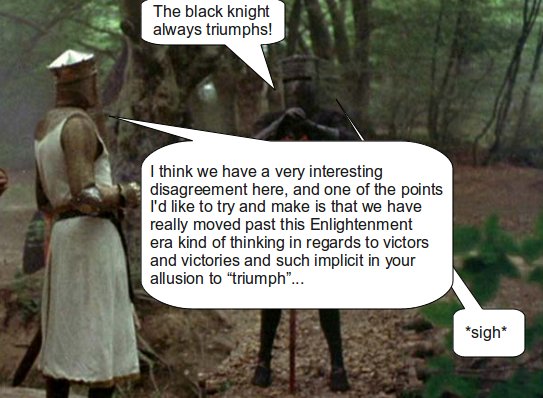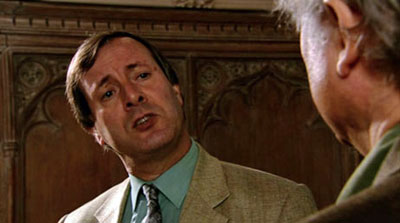I recently saw a debate on YouTube between Alistair McGrath and Richard Dawkins. As I was previously acquainted with McGrath as the author of The Dawkins Delusion, I looked forward to the debate with great anticipation. Not only is McGrath a Doctor of Microbiology, but he also holds a doctorate in theology, and he is a fellow of Oxford–in essence a peer of Richard Dawkins himself (not to mention the esteemed author and Christian apologist C. S. Lewis). It seemed I was in for a real treat.
As the debate progressed along, I was progressively confused and dismayed. At the end of it, I was incensed. Ironically enough, I think I concluded the video series having more respect for Dawkins than McGrath. Consider the following…
“I think really my fascination with Professor Dawkins’ book really is that it raises some extremely interesting questions,” McGrath says early on. Unfortunately, we won’t hear answers to any of those questions in the discussion. McGrath rambles on about this and that without really narrowing down the debate and directly addressing the issues at hand. He reveals himself to be a postmodern thinker (a fact I later verified when researching his other writings) and thus is more fond of blathering on about feel-good platitudes than really arriving at any definitions of what is true or false.
Dawkins is more than willing to say things like “He’s wrong” and ask simple questions like “Is it as a matter of fact true that there is a supernatural being?”
Meanwhile, McGrath is wont to say verbose and absurdly irrelevant things like “We are living in an era which has actually seen the collapse of the Enlightenment way of thinking.”
When asked a simple question “[Do] you believe the Muslim view to be wrong?” by the moderator, here is McGrath’s long-winded rambling response…
“I would want to say something like this: I believe—very passionately—that Islam is seeking something with great honesty and great integrity, but I believe also that Christianity brings to fulfillment that honest quest for truth and that actually that seems to me to be a respectful yet same time for me to be an intellectually honest way of understanding the situation.”
 How hard is it to say “Yes”? Of course Islam is wrong. It makes fundamental claims in and about the Qu’ran that are fundamentally wrong! Every Orthodox Christian that has the faintest acquaintance with Islam would easily say “Yes, Islam is wrong.”
How hard is it to say “Yes”? Of course Islam is wrong. It makes fundamental claims in and about the Qu’ran that are fundamentally wrong! Every Orthodox Christian that has the faintest acquaintance with Islam would easily say “Yes, Islam is wrong.”
It seems McGrath is afraid of doing that. I suppose one could argue that in essence McGrath was saying that in implying that Christianity “brings to fulfillment” something that Islam did not fulfill. However, that response not only seems terribly evasive and ambiguous, it also is completely confusing, considering that Islam postdates Christianity by hundreds of years! It’s easy to see how one might say Christianity “brings to fulfillment” the messianic hopes of Judaism, but that phraseology is misleading at best when speaking of a religion that emerged centuries after that Messiah appeared and completely denies and/or radically redefines the message of that figure.
Rather than truly discuss the fundamental thesis of this debate, which is essentially the truth of God’s existence, McGrath instead chooses to focus on peripheral issues like religious violence. And in that vain, he makes some highly erroneous statements. For example…
 “Jesus did violence to no one; He had violence done to Him.” Really? This isn’t the same Jesus I know from scriptures. What about the Jesus who “made a scourge of cords, and drove [the money changers] all out of the temple… and overturned their tables” (John 2:15)? What about the Jesus who told His disciples “whoever has no sword is to sell his coat and buy one” (Luke 22:36)? What about the Jesus who related the parable of the ten minas about the kingdom of God which culminates with the King in the parable saying “those enemies of mine who did not want me to be king over them—bring them here and kill them in front of me” (Luke 19:26)?
“Jesus did violence to no one; He had violence done to Him.” Really? This isn’t the same Jesus I know from scriptures. What about the Jesus who “made a scourge of cords, and drove [the money changers] all out of the temple… and overturned their tables” (John 2:15)? What about the Jesus who told His disciples “whoever has no sword is to sell his coat and buy one” (Luke 22:36)? What about the Jesus who related the parable of the ten minas about the kingdom of God which culminates with the King in the parable saying “those enemies of mine who did not want me to be king over them—bring them here and kill them in front of me” (Luke 19:26)?
McGrath’s analysis of the crucifixion is shallow to say the least, and he relates his thoughts in the context of commending the Amish in their response to the murderous assault on West Nickel Mines school. While I certainly have sympathy for their loss and find their willingness to forgive commendable, does forgiveness necessitate inaction in executing justice? Can we not forgive someone of their sins against us and still for the glory of God “remove the evil from [our] midst” (Deuteronomy 21:21), when we have this mass murderer killed by the authorities?
Commending the pacifist doctrine of a heretical cult is disturbing to say the least. The Amish believe baptism is necessary for salvation, engage in high-control group tactics to enforce the regulation of extra-biblical traditions (such as abstaining from electricity), and shun former friends and family just as do any number of cults. For McGrath to describe this cult in such glowing terms, stating that “they take the moral example of Jesus with the utmost seriousness” is simply shocking.
Suffice it to say, I was thoroughly displeased with the whole series. The debate was like watching the black knight duel with the ghost of the white knight. There was so much potential here in McGrath, but ultimately his theology is demonstrated to be dead and his philosophy completely ineffectual. Dawkins was not able to land any blows, but neither was McGrath. Tried as he might to narrow down the subject and come to some definite conclusions, McGrath’s postmodern rhetoric simply wouldn’t allow that, and as much as McGrath might prattle on about this or that his statements proved to be completely hollow and inconclusive.
 “Richard Dawkins and Alister McGrath’s Debate at The Oxford Literary Festival”
“Richard Dawkins and Alister McGrath’s Debate at The Oxford Literary Festival”
– Part 1
– Part 2
– Part 3
– Part 4
– Part 5
– Part 6
– Part 7
—



Holy cnoscie data batman. Lol!